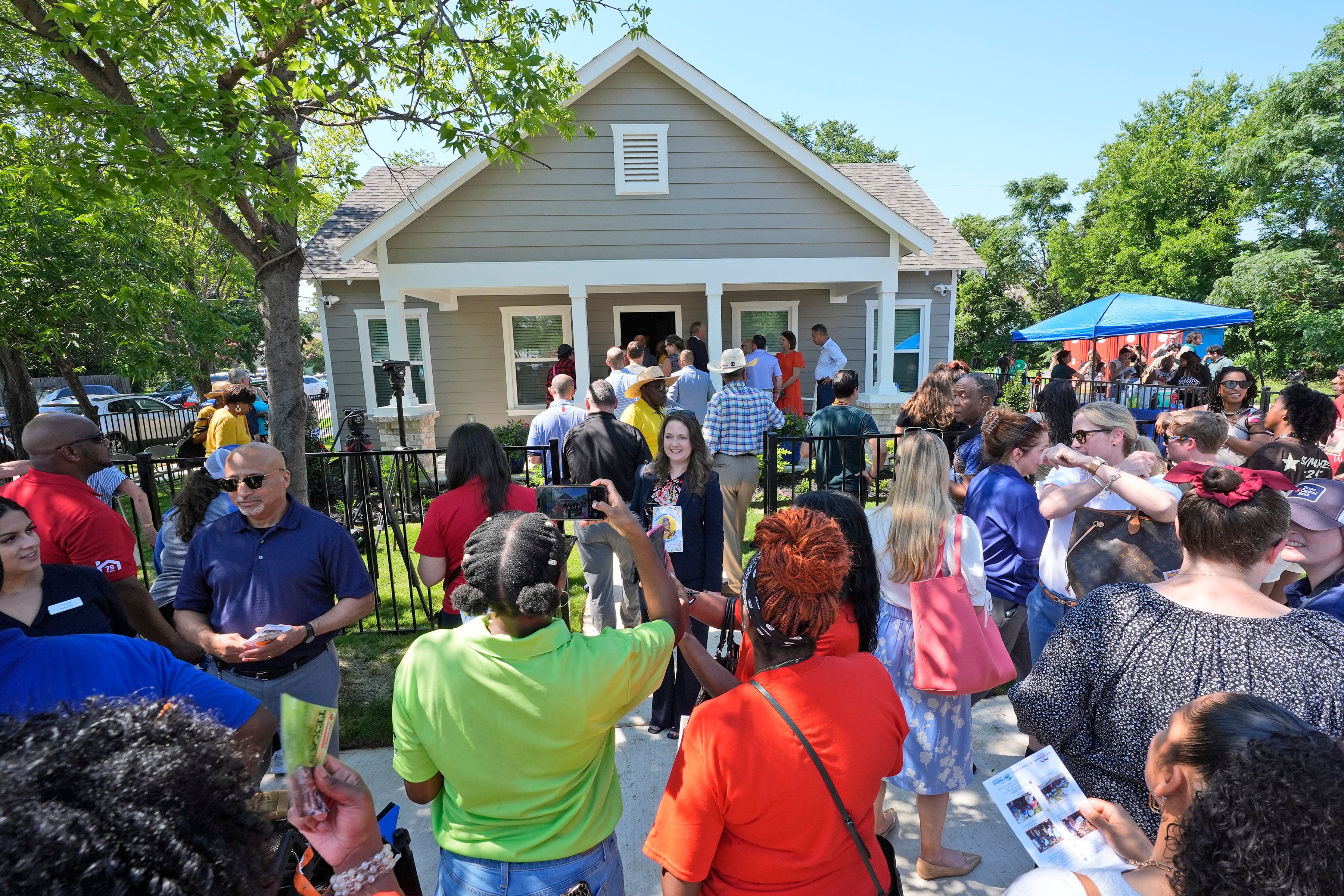‘Grandmother of Juneteenth’ handed keys to new Texas home 85 years after racist mob burned it down
Opal Lee, who helped make Juneteenth a holiday, was awarded the Presidential Medal of Freedom this year
Your support helps us to tell the story
From reproductive rights to climate change to Big Tech, The Independent is on the ground when the story is developing. Whether it's investigating the financials of Elon Musk's pro-Trump PAC or producing our latest documentary, 'The A Word', which shines a light on the American women fighting for reproductive rights, we know how important it is to parse out the facts from the messaging.
At such a critical moment in US history, we need reporters on the ground. Your donation allows us to keep sending journalists to speak to both sides of the story.
The Independent is trusted by Americans across the entire political spectrum. And unlike many other quality news outlets, we choose not to lock Americans out of our reporting and analysis with paywalls. We believe quality journalism should be available to everyone, paid for by those who can afford it.
Your support makes all the difference.A white mob burned down Opal Lee’s family home in Fort Worth, Texas in 1939. She was 12 years old.
Eighty-five years later, Lee, now 97, got the keys to a new home - at the exact same site.
The civil rights activist has spearheaded a national campaign for federal recognition of Juneteenth for decades, culminating with a symbolic 1,400-mile march from Fort Worth to Washington, DC, in 2016.
Juneteenth, the oldest annual commemoration of the end of slavery in America, was finally formally designated a national holiday in 2021, and Lee received the Presidential Medal of Freedom earlier this year, recognizing her leadership as the “grandmother of Juneteenth.”
“I’m wanting young people to realize that we can make a difference. And so I’m asking them to make themselves a committee of one to change somebody’s mind,” Lee told ABC News of her legacy of civil rights activism.
“We know people who aren’t on the same page will change their minds,” she added. “You’ll have to work at it. But if people have been taught to hate, they can be taught to love.”

June 19 also marks the anniversary of the attack that drove Lee and her family out of their home in 1939.
Shortly after Lee’s family moved into the predominantly white neighborhood, a mob of 500 people surrounded Lee’s family home, broke windows, dragged out furniture and then torched the property. Lee was sent to stay at a neighbor’s house, and her family “buried” the painful memory of the attack, according to Lee.
“My God-fearing, praying parents worked extremely hard and they bought another home,” she told the Associated Press. “It didn’t stop them. They didn’t get angry and get frustrated, they simply knew that we had to have a place to stay and they got busy finding one for us.”
Community groups and nonprofit housing organization Habitat for Humanity, which owned the land where her family’s home once stood, helped build and furnish a new house on the property within three months, in time for 2024’s Juneteenth holiday.

Juneteenth was first recognized by formerly enslaved African Americans in Texas in 1866, one year after 2,000 Union Army soldiers landed in Galveston with belated news of slavery’s end.
Their announcement came more than two years after Abraham Lincoln’s Emancipation Proclamation address, which signaled the end of slavery during the bloody Civil War. But the order did not end the enslavement of all people in the nation at the time.
The 13th Amendment to the Constitution, which formally abolished slavery in the US, wasn’t passed by Congress until January 31, 1865. Meanwhile, slave owners in Texas suppressed the news of freedom to the people they enslaved, withholding them in bondage.
Juneteenth celebrations grew across the US with memorials, parades, concerts, family gatherings and other events among Black communities, while Lee and other civil rights activists and lawmakers pushed federal and state governments to formally recognize the holiday.
The campaign continued to grow in the wake of international protests against police violence and systemic racism after the murder of George Floyd in 2020.
President Joe Biden signed a measure into law that creates Juneteenth as the nation’s 11th annual public holiday after a unanimous vote in the Senate and overwhelming bipartisan support in the House of Representatives.
“On Juneteenth, may we celebrate the essence of freedom that galvanized the country, the progress we have made in our Nation, and all that is possible when we march forward together,” the president wrote in a proclamation observing this year’s holiday. “May we all recommit to redeeming the very soul of America – choosing love over hate, unity over division, and progress over retreat.”

Join our commenting forum
Join thought-provoking conversations, follow other Independent readers and see their replies
Comments